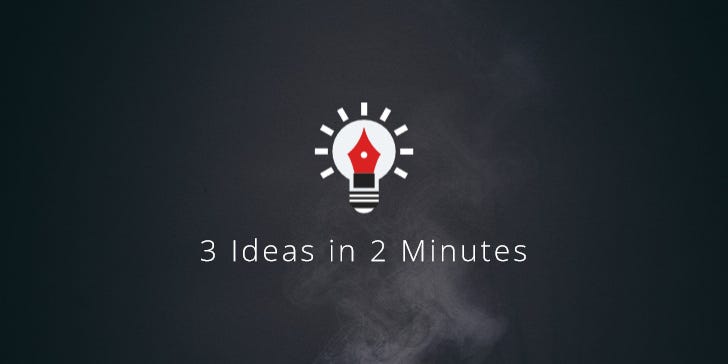#155: Master Zhuang’s Paradox, Paradox of Unanimity & Morton's Fork
3 Ideas in 2 Minutes on Paradoxical Thinking
I. Master Zhuang’s Paradox
Zhuang Zhou was a Chinese philosopher famous for his Butterfly Dream story. Also known as Master Zhuang’s Paradox, it plays with the dichotomy of waking and dreaming:
Once, Zhuang Zhou dreamed he was a butterfly, a butterfly flitting and fluttering about, happy with himself and doing as he pleased. He didn't know that he was Zhuang Zhou.
Suddenly he woke up and there he was, solid and unmistakable Zhuang Zhou. But he didn't know if he was Zhuang Zhou who had dreamt he was a butterfly, or a butterfly dreaming that he was Zhuang Zhou. Between Zhuang Zhou and the butterfly there must be some distinction! This is called the Transformation of Things.
— Zhuangzi Basic Writings
If you don’t know when you’re dreaming, how can you tell if you’re awake or asleep?
II. Paradox of Unanimity
A murder has happened. Unfortunately, there are many eyewitnesses who all wholeheartedly agree on who the killer is. This will sound counterintuitive, but if all witnesses agree to have seen the same thing, it’s probably too good to be true. This is the Paradox of Unanimity coined in a 2016 paper by Derek Abbott et al. from the University of Adelaide, ‘Straya:
Unanimity is often assumed to be reliable. However, it turns out that the probability of a large number of people all agreeing is small, so our confidence in unanimity is ill-founded. This 'paradox of unanimity' shows that often we are far less certain than we think.
Since consensus can quickly become a crutch, it’s worth considering contrarian thinking techniques such as Devil’s Advocacy or Premortem Analysis.
III. Morton's Fork
A well-crafted paradox cannot only be used to tease our brains. It can also be used to manipulate.
Please meet John Morton, archbishop of Canterbury and Lord Chancellor to Henry VII, King of England. In the 15th century, he raised the benevolence tax and justified it with cunning reasoning known as Morton’s Fork.
If you live in extravagance, you can no doubt afford to pay the tax. If you live humbly on the other hand, it means you must have saved some money so you can pay the tax, too.
This fake paradox comes in many variations, all of which offer you the false dilemma of two statements that lead to the same conclusion. 🐘
Have a great week,
Chris
themindcollection.com

